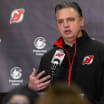The New Jersey Devils' initial training camp roster was drastically reduced last week and the final decisions on this year's opening night roster are coming within the next few days. With so many players heading back to the pipeline, who keeps track of their progress?
Developing the Devils
By
Julie Robenhymer / newjerseydevils.com
Assistant general manager Tom Fitzgerald oversees the development staff of Scott Clemmensen, Patrick Rissmiller and Eric Weinrich. These are the men who will travel across the continent and check in regularly with prospects like Alex Kerfoot at Harvard, Mike McLeod in Mississauga and the plethora of prospects - like John Quenneville, Blake Coleman and Joe Blandisi - honing their craft in Albany and awaiting their chance at a roster spot in New Jersey.
"Development coaches are a conduit between their club team and us," Fitzgerald said. "And these guys are excellent at what they do."
But what exactly does a development coach do?
"We are an extension of management and coaches," Rissmiller said. "We're not exactly coaching them because they have their own coaches with whatever team they're playing for now, but we keep tabs on their performances, their skills and habits and we're there to offer advice and help them get where they want to go, but our main function is to monitor their progress and give feedback to the higher-ups."
As the saying goes, character is defined by what you do while no one's watching. Well…so are hockey players.
"We ask these players to have input on their own careers. They have to take ownership. We can give them all the resources of development - a skating coach, a skills coach, a game plan for nutrition, a game plan for physical strength - but at the end of the day, we have to trust that these players want to have careers and will actually do the work," explained Fitzgerald, who spent 17 seasons as a player before entering management. "Our job is to educate them and give them everything they need to be successful, but we can't do it for them."
Devils management can't be with these prospects every day to make sure they're doing what they're supposed to be doing to improve, but the development staff aims to be the eyes and ears of management and see the prospects, or at the very least check in with them, once every two to three weeks, more if they are in Albany.
"I think that's another part of our roll, just to let them know that the organization cares about their development and that we are keeping track of them and helping them feel like they're part of the organization," said Weinrich, who was drafted by the Devils and had a 20-year career. "Even if they're not under contract, we're still interested in them and their development and want to see them sign a contract one day."
Said Fitzgerald: "When they are sent back to juniors or go to college or to the AHL, they know what their foundation keys are because they've had input in the discussion. Together we've identified their strengths and weaknesses and developed a plan of training or nutrition to help them get better and then we follow up with them. We'll call their coaches and ask about their practice habits and what they're doing off the ice. A guy might score five points in a weekend, but then I call his coach and he tells me he didn't play well and got lucky with those points. The player thinks he had a great weekend, but the coach is telling me something different and it's our job to be that buffer and make sure the player and his coach are on the same page and, ultimately, help the player continue to get better."
This is why it's important for the development coaches to have great relationships with the players. Not only are they the go between from player to management, they also function as a go between from coach to player.
"You have to find out what works and what doesn't with these guys," said Rissmiller, who had a 13-year career as a player. "Everyone has their own personality and some guys need to be pushed a little bit and challenged and maybe for other guys, you need to reign them in a little bit. And also we can help them sort through things. Maybe they got an earful from their coach and we can be someone they can talk to and help them deal with the situation and get them back on right path in terms of progress."
In all, the trio, which all joined the Devils last summer, are relishing their roles within the organization.
"There really isn't a challenge to it because it's a really rewarding job. You get to build a relationship with the kids and I love to see them get better and go from a minor league team to the NHL," Weinrich said. "It's really fun to watch their progression. I've only been here one year, but every kid we've had has really improved a lot in that one year so it's been really great from my perspective."
For Clemmensen, who has a 14-year professional career on his resume, he sees himself as a mentor for these prospects not only for a career in hockey, but also for life.
"Establishing a personal relationship with them is very important and, in doing that, you get to know these guys and their goals become your goals and you want them all to make it to the NHL, but realistically that's probably not going to happen. So knowing that they're not all going to become NHL players is the hard part, but helping them become the best player and the best person they can be is the challenge and what I work towards every day."


















